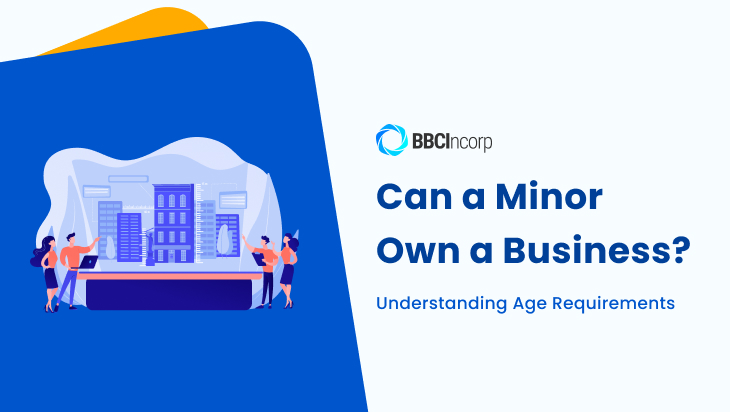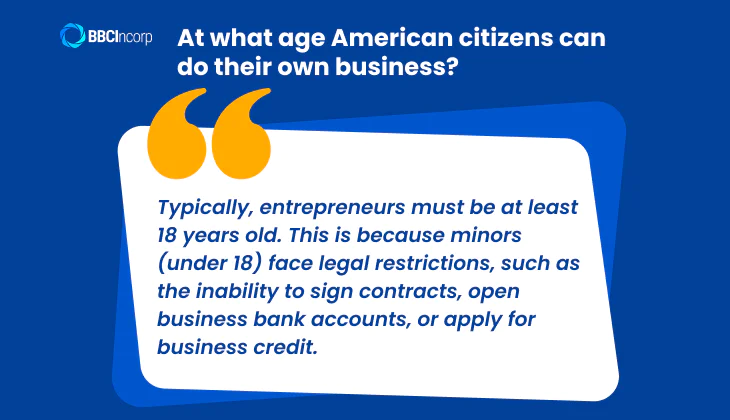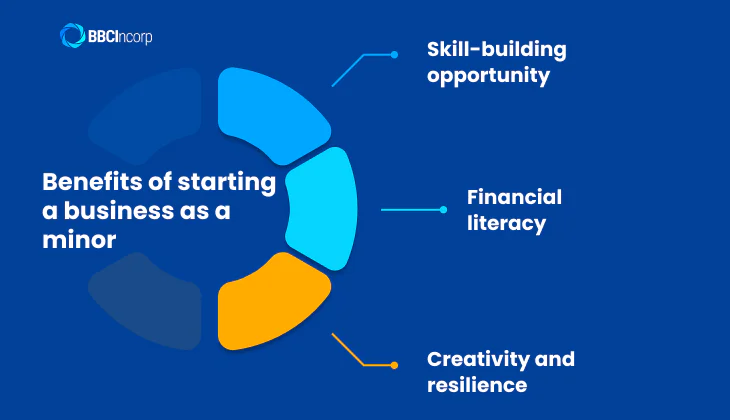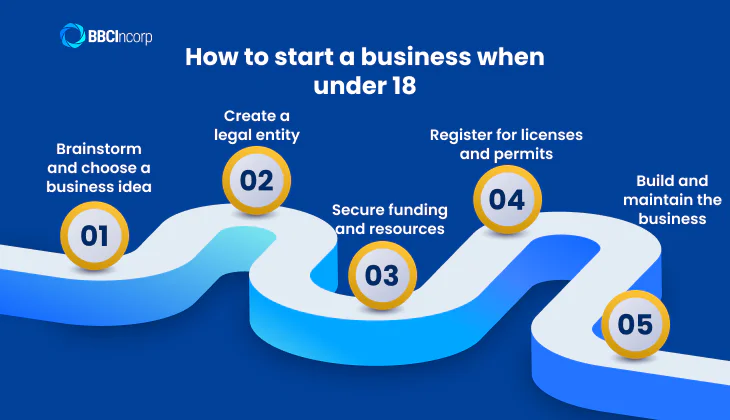
Table of Contents
Around the world and especially in the U.S., we are seeing a surge in young people wanting to start their own ventures, prompting the key question: Can a minor own a business? This global trend, evident in the growth of youth entrepreneurship initiatives, presents both exciting possibilities and intricate legal considerations.
While various countries impose age-related restrictions, particularly around contracts and legal responsibilities, many jurisdictions allow minors to participate in business with parental or guardian consent or through specific legal structures like trusts. This article breaks down the complexities of the legal landscape, guiding young business owners on how to turn their innovative ideas into success.
Can a minor start a business?
Entrepreneurship is not limited by age. In fact, more and more innovators are launching successful businesses before turning 18. As a result, they are driving a critical question: Can a minor own a business?
Although the laws tend to vary by state, it is crucial to understand the rules before starting a business as a minor, or researching as a minor’s guardian.
Understanding U.S. state-specific regulations
Particularly within the United States, the legal capacity of minors to establish businesses is not uniformly defined.
States such as Colorado and Illinois implement stringent regulations, primarily due to minors’ limited contractual capacity and legal liability. These limitations effectively preclude minors from formally incorporating or operating businesses. Conversely, states like Texas and California offer greater entrepreneurial latitude.
Here are some key rules to note:
- Minors generally lack the legal capacity to enter into binding contracts, meaning they are more likely to void agreements.
- They may not be held fully liable for business debts or legal obligations, which can create uncertainty for business partners.
- Each state sets its own rules regarding business formation, including age restrictions.
LLC ownership and parental/guardian involvement
A frequent query arises regarding the feasibility of minors owning Limited Liability Companies (LLCs), as evidenced by searches like “Can a 15-year-old start a business?” or “Can a minor start an LLC?”
The answer is nuanced. In reality, direct ownership and management may be constrained, minors can often participate in LLCs with the support of parents or guardians. These adults serve as essential facilitators, as they will be handling legal formalities such as contract execution and the filing of Statements of Authority for LLC formation. Furthermore, they play a vital role in developing comprehensive Operating Agreements that delineate member roles, responsibilities, and profit distribution.
Consequently, a singular “LLC age requirement” does not exist. Instead, a set of location-specific conditions must be met. Some jurisdictions necessitate court-appointed guardians to represent the minor’s interests, while others accept parental consent.
How old do you have to be to start a business?
At what age can American citizens do their own business? There is no universal minimum age to start a business in the United States. Typically, entrepreneurs must be at least 18 years old.
This is because minors (under 18) face legal restrictions, such as the inability to sign contracts, open business bank accounts, or apply for business credit. However, some states allow minors to own businesses with parental or guardian involvement.

Despite these challenges, young entrepreneurs continue to thrive. Take Moziah Bridges, who launched his bow tie company at nine, or Mikaila Ulmer, who started a lemonade business at four and later secured a deal with Whole Foods. Their success reflects the growing opportunities for minors in business, particularly with the rise of digital platforms.
Today, E-commerce, social media, and freelancing platforms have made entrepreneurship more accessible. Minors can now launch online stores, offer digital services, or monetize content with minimal upfront investment.
If you’re wondering, “What age can American citizens do their own business?” or “How old do you have to be to own a business?”, it depends on your location and business structure. By having the right guidance and protection, even minor business owners can maintain compliance with the states’ rules and build successful ventures.
Should minors start a business?
Starting a business from a young age may become a transformative experience. This decision creates a space for learning invaluable skills and knowledge that extend beyond traditional education. For example, there’s the opportunity to learn about finance, marketing, and operations firsthand, which is a powerful motivator for passionate individuals.
Ultimately, the question remains: Do the benefits of launching a business at a young age outweigh the inherent risks? Let us delve further into the topic.
Benefits of starting a business as a minor

Skill-building opportunity
One major benefit is skill-building. Early business ventures provide minors with invaluable skill development. They acquire practical proficiencies in problem-solving, communication, and leadership, all of which are transferable across various career paths.
The extended timeline afforded to young entrepreneurs facilitates enhanced adaptability and mastery of skills, such as language acquisition and physical endurance, which are often much easier to pick up when you’re young.
Financial literacy
Entrepreneurship also promotes financial literacy. As the young gain firsthand experience in budgeting, pricing strategies, and revenue management, they are cultivating responsible financial habits from an early age. This practical exposure creates a significant advantage in understanding investment principles, tax obligations, and savings strategies.
Creativity and resilience
Business ownership nurtures creativity, independence, and resilience. As young entrepreneurs learn to innovate and proactively protect their passion, they develop enhanced confidence in handling challenges. Whether through e-commerce, service provision, or product development, they build the capacity to overcome obstacles and persist through setbacks.
Despite legal and logistical considerations, minors can successfully launch and manage businesses with the appropriate support. Thus, in response to the inquiry, “Can a minor start a business?” The answer is yes, and doing so can provide long-term benefits.
Challenges you might face
Legal and administrative barriers
In most cases, minors cannot sign binding legal documents. How old do you have to be to get a business license? You have to be at least 18 in most states. So, until then, adult support is essential.
The legal requirement for parental or guardian involvement in signing documents is a key challenge for minors. This affects contracts and licenses, particularly in regulated sectors like alcohol. Therefore, careful planning and consistent adult assistance are vital.
Balancing business with education and personal life
Managing a business while maintaining academic performance and personal life demands exceptional time management. Per that, young entrepreneurs must develop strategies for prioritizing tasks, setting realistic goals, and delegating responsibilities.
Sometimes, outsourcing tasks can free up time to focus on the most important parts of the business and your life as a growing individual.
Access to funding and resources
Given limited financial independence and challenges in securing traditional loans, young entrepreneurs must actively seek creative funding solutions. Fortunately, a growing network of community programs and youth-specific grants offers the support you need. These resources not only bridge financial gaps but also provide access to vital tools and mentorship.
For helpful information on grants and incentives, you should always consult with professionals in your specific jurisdiction.
Tips for young aspiring business owners
Here are useful tips to help you navigate the entrepreneurial journey successfully:
- Secure a mentor: Seek guidance from experienced entrepreneurs or business professionals. A mentor’s insights can provide invaluable direction, helping you avoid common pitfalls and accelerate your learning curve.
- Prioritize education: Balance your business endeavors with academic responsibilities. Your education is a long-term investment that complements your enterprise pursuits.
- Cultivate a support network: Surround yourself with supportive family, friends, and peers. Their encouragement and assistance are crucial during challenging times.
- Manage time wisely: Improve your task-organizing skills, set realistic goals, and utilize tools like calendars and to-do lists to stay organized and efficient.
- Leverage online resources: Take advantage of the wealth of free online courses, webinars, and articles available on various topics.
- Start small and scale gradually: Begin with a manageable business model and gradually expand your operations as your skills and resources develop.
- Maintain detailed records: Keep written or digital records of decisions, ideas, financial transactions, contracts, and business activities.
- Prioritize your well-being: Take care of yourself. Get enough rest, eat moderately, and have healthy hobbies. This will help you avoid burnout and nurture your passion for your craft in the long run.
How to start a business when under 18?
While age might seem like a barrier, it doesn’t have to be. In general, the setup process as a minor goes through the following steps:

Step 1: Brainstorm and choose a business idea
Selecting the right business idea requires considering passion, skills, and available free time. Some businesses demand minimal startup costs, while others require significant investment.
As an owner, you must first assess whether the idea is feasible based on available resources and the target audience. Popular business ideas for minors include tutoring, DIY crafts, babysitting, pet sitting, and cleaning services. In addition, digital options like freelancing, content creation, or reselling items online are also great choices.
Step 2: Create a legal entity
In states that allow minors to form businesses, setting up an Limited Liability Company (LLC) is an option. Can a minor start an LLC? Yes, however, in states with age restrictions, a parent or guardian needs to sign legal documents or act as a registered agent. Sole proprietorships are also an alternative, but they don’t provide liability protection like an LLC.
When forming a business, choosing a unique and searchable name is crucial. A well-branded name makes marketing and online presence easier.
Step 3: Secure funding and resources
Minors often need to find creative ways to fund their ventures. Possible funding sources are:
- Personal savings from allowances or part-time jobs
- Family contributions from supportive relatives
- Scholarships or grants for young entrepreneurs
For those wondering how to start a business at 13, lean budgeting is key. Focus on low-cost marketing, free online tools, and reinvesting profits to grow gradually.
Step 4: Register for licenses and permits
Once your business structure and funding are in place, obtaining necessary licenses and permits is the next step. However, minors typically require legal assistance. Depending on state and local laws, a guardian or designated third party may need to apply on their behalf. You can launch an online business in advance to test the water
Step 5: Build and maintain the business
Finally, nurturing the business requires ongoing effort and dedication. This involves implementing effective marketing strategies, adhering to legal requirements, and maintaining accurate financial records through diligent expense tracking and bookkeeping.
Therefore, proactive consultation with relevant professional advisors is highly recommended.
Form an LLC for minor with BBCIncorp
Setting up an LLC as a minor can be daunting, but BBCIncorp simplifies the process. We understand the unique challenges young entrepreneurs face, and we’ve streamlined our services for a smooth setup. Our expert team handles all aspects of your Delaware LLC, allowing you to focus on your vision.
Our Delaware company formation package offers numerous benefits:
- Swift and affordable registration
- Handling of annual compliance
- Seamless banking integration with global platforms like Wise and Payoneer
- Other business needs such as corporate secretarial services, accounting, bookkeeping, reporting, renewals, etc.
- Dedicated and comprehensive support from our expert team.
Let BBCIncorp empower your entrepreneurial journey. Contact our team today for detailed information and expert advice!
Conclusion
The increasing number of young entrepreneurs around the world proves age is no barrier to business. In fact, this growing trend is raising a vital question: “Can a minor own a business?” While the answer is often yes, legal restrictions and state-specific regulations present significant considerations.
Going at their own pace, mastering time management, leveraging digital tools, and seeking mentorship from experts are key strategies the young should keep in mind.
For complex legal and financial aspects, such as LLC formation, get in touch with the BBCIncorp support team today at service@bbcincorp.com to start your journey with ease.
Frequently Asked Questions
Can a minor start their own business without adult involvement?
The short answer is, in most cases, no.
While a minor might possess innovative ideas, due to legal limitations on contractual capacity, minors will likely require parental or guardian involvement. This is especially true for formal business structures like LLCs or corporations, and for obtaining licenses and permits. While certain small, informal ventures might be feasible, any substantial legal or financial undertaking will almost certainly require adult assistance.
What’s the youngest age one can form an LLC?
There’s no single “youngest age” because LLC rules vary by state. The legal age of majority, which is 18, is a key factor.
In some states, minors under 18 can’t form LLCs at all. In others, parental or guardian help is needed. Even where it’s allowed, practical issues like bank accounts and contracts often require adult involvement.
How can a minor grow their business while keeping it manageable?
Here are a few tips for young aspiring entrepreneurs to balance their lives with their work:
- Begin with a simple business model and gradually expand.
- Use schedules and tools to balance business, school, and personal life.
- Ask for help from family, friends, and mentors in the field.
- Outsource specialized tasks that require professional assistance (e.g., accounting, bookkeeping, etc).
- Automate tasks and streamline processes with high-tech tools.
- Aim for achievable milestones and celebrate progress.
Most importantly, prioritize your health and well-being. A balanced approach will ensure long-term success without harmful burnout.
At what age do American citizens do their own business?
While there’s no federal minimum age to start a business in the U.S., state laws dictate the specific rules. Minors can engage in entrepreneurial activities, but legal limitations on contracts and licensing often necessitate adult involvement, especially for formal structures like LLCs. Forming a legally recognized business typically requires someone 18 or older.
Although studies suggest the average entrepreneur is in their mid-30s, this is shifting, and people of all ages start businesses. Therefore, while legal restrictions exist for those under 18, the ability for American citizens to do “their own business” is not strictly limited by age.
Disclaimer: While BBCIncorp strives to make the information on this website as timely and accurate as possible, the information itself is for reference purposes only. You should not substitute the information provided in this article for competent legal advice. Feel free to contact BBCIncorp’s customer services for advice on your specific cases.
Industry News & Insights
Get helpful tips and info from our newsletter!
Stay in the know and be empowered with our strategic how-tos, resources, and guidelines.





